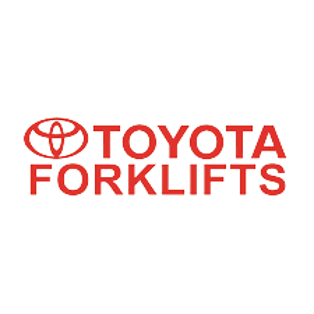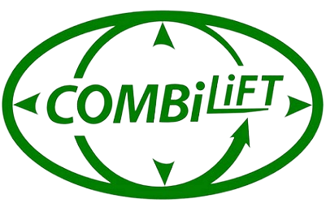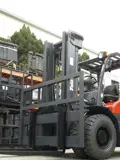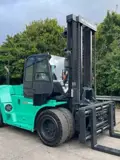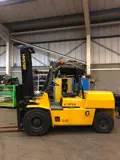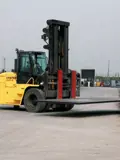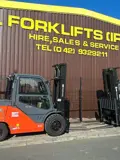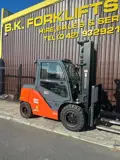Heavy-duty forklifts
Heavy-duty forklifts are designed to handle large and heavy loads in demanding industrial and commercial environments. These forklifts are built to withstand the rigors of heavy lifting and are commonly used in industries such as construction, mining, shipping, manufacturing, and more. Here are some key features and considerations for heavy-duty forklifts:
Key Features of Heavy-Duty Forklifts:
-
High Load Capacity: Heavy-duty forklifts are capable of lifting and transporting extremely heavy loads, often ranging from 15,000 pounds (6,800 kg) and beyond.
-
Durability: These forklifts are constructed with robust materials and components to withstand the stresses of heavy lifting operations.
-
Stability: Heavy-duty forklifts are designed with stability in mind, ensuring safe lifting and transporting of large loads.
-
Powerful Engines: These forklifts are equipped with powerful internal combustion engines, such as diesel or propane, to provide the necessary torque for lifting heavy loads.
-
Lifting Height: Heavy-duty forklifts often have extended lifting heights to accommodate stacking and storage of materials in tall racks or containers.
-
Tire Options: Depending on the application, heavy-duty forklifts may come with different tire options, such as solid pneumatic tires for rough terrains or cushion tires for indoor use.
-
Operator Comfort: Despite their heavy-duty nature, modern heavy-duty forklifts often include ergonomic features to ensure operator comfort during long shifts.
-
Safety Features: These forklifts are equipped with safety features such as stability systems, load sensors, and operator visibility enhancements to prevent accidents.
Considerations for Heavy-Duty Forklifts:
-
Load Requirements: Determine the maximum weight and dimensions of the loads you'll be handling. Choose a heavy-duty forklift with the appropriate load capacity for your needs.
-
Application: Consider the type of environment in which the forklift will be used. Heavy-duty forklifts designed for construction sites might differ from those used in warehouses.
-
Terrain: If your operation requires outdoor use or rough terrains, opt for heavy-duty forklifts with the appropriate tire type for the terrain.
-
Fuel Type: Decide whether you prefer diesel, propane, or other fuel types based on factors like fuel availability and emission regulations.
-
Maintenance: Heavy-duty forklifts require regular maintenance to ensure optimal performance and longevity. Consider maintenance costs and downtime in your decision.
-
Operator Training: Due to their specialized nature, operators should receive proper training to safely operate heavy-duty forklifts.
-
Budget: Heavy-duty forklifts are a significant investment, so consider your budget for both the initial purchase and ongoing maintenance.
-
Safety: Safety is paramount when dealing with heavy loads. Ensure that the forklift is equipped with the necessary safety features and that operators follow safety protocols.
When selecting a heavy-duty forklift, work closely with forklift dealers or professionals who can provide guidance based on your specific needs and the demands of your industry. Remember that the right heavy-duty forklift can significantly enhance efficiency and productivity in heavy load handling operations.

